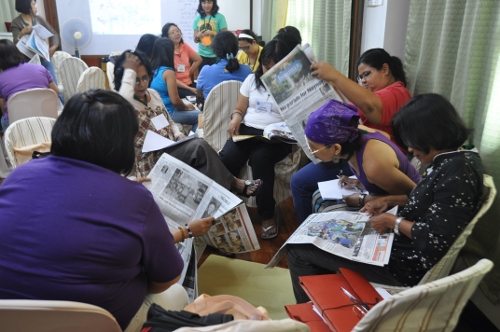- Details
We, the individuals and organizations signing this document, express our solidarity with Valentina Rosendo Cantú and Inés Fernández Ortega. These indigenous women from the Me’phaa nation, in the state of Guerrero, Mexico, were raped and tortured by members of the militia in 2002. Furthermore we categorically condemn the attacks and threats that these women, their families and the indigenous organizations that have supported them, have faced and continue to face to this day, and we express our outrage at the lack of effective response from the Mexican Government.
- Details
“The 16 Days of Activism are about reminding everyone that the world will not know peace, development or justice, if women are violated.” These are words expressed by Everjoice Win of the Women's Global Leadership Initiative (WGLI), summarising the main principles of the campaign when it was launched in 1992. The campaign allowed women’s groups and networks all over the world to articulate the different ways violence against women is experienced.
Read more: 16 Days of Activism to End Gender Based Violence: Isis International in Action
- Details
By Sabrina Buzzalino, Isis International

This was the resounding call of participants who attended the recently concluded Isis Activist School on Engendering Climate Justice: The Southeast Asia Experience, in Manila, Philippines from 3-5 August 2010.
The Activist School on Engendering Climate Justice is part of a year long project where Isis endeavored to raise awareness on Southern women's experiences of the impact of climate change, its impact on women and its linkages to other gender issues. The project is aimed at surfacing southern women's perspectives and feminist analyses on climate change and the United Nations Framework Convention on Climate Change (UNFCCC), as well as strengthening feminist positions on gender and climate change in NGO-led processes.
- Details
All over the world , women have cause for celebrations as the United Nations General Assembly adopted a resolution on July 2, 2010 creating the UN Entity for Gender Equality and the Empowerment of Women.
UN Women, as it is now named, is the result of years of negotiations between member states, and advocacy by the global women's movement. It is also part of the UN reform agenda that aims to bring together resources and mandates for greater impact and efficiency. More specifically, it is the response to challenges faced by the UN in its efforts to promote gender equality globally, including inadequate funding and the absence of a single driver recognised to direct all UN activities on gender equality issues.
Read more: Creation of UN Gender Entity sparks celebrations and cautious optimism among women
- Details
by Anna Dinglasan, Isis International
Barely a month as the new president of the Philippines, Benigno “Noynoy” Aquino Jr. already has women's organisations, both locally and internationally based, keeping a watchful on him.
Aquino has been cornered about his views and plans on reproductive health, which has remained one of the most controversial issues in the country.
Read more: Women keep watchful eye on new Philippine President on Reproductive Health Issues
- Details
by Vaseva Samugh
The current financial crisis is the worst that the world has ever dealt with since the Great Depression in the 1930's. The crisis began to take place in 2007 and believed to have started in the United States and rapidly spreading to the world in an economic recession.
Read more: Impact of financial crisis on women, feminist movement and their views
Page 24 of 62





 The
The 
 Isis Resource Center holds one of the largest feminist collections of materials in the Global South. With 40 years of publication experience, Isis holds a vast collection.
Isis Resource Center holds one of the largest feminist collections of materials in the Global South. With 40 years of publication experience, Isis holds a vast collection.